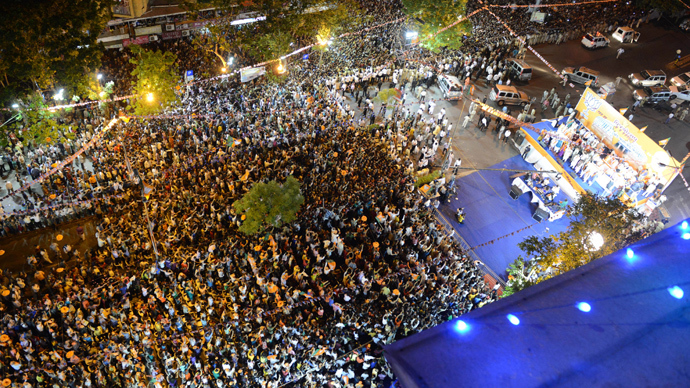‘Modi-fied’ India: Implications of BJP’s landslide win

The Bharatiya Janata Party (BJP) stormed into power on Friday riding on the crest of a Narendra Modi tsunami which gave a clear majority to a single party for the first time in India for 30 years and swept the ruling Congress into oblivion.
It has become the worst-ever electoral performance by the Grand
Old Party. With Modi emerging as the undisputed strong man of
India, this will have its own implications for the world.
Here is my take on the specific countries and regions that are
crucial for India.
South Asia/India’s Neighborhood: Modi’s
emergence as the undisputed strongman in India and the sole
decision-maker should make India’s smaller neighbors more
cautious. Nepal and the Maldives have repeatedly cocked a snook
at India during their tenure of the United Progressive Alliance
(UPA) government headed by Manmohan Singh. Sri Lanka and
Bangladesh bugged India with their own pinpricks. They could
afford to do so as the UPA government was bogged down in
coalition politics. This mindset should see a sea change.
Pakistan: The country’s entire leadership,
particularly military, is prone to India-bashing, something that
would get a fitting verbal lashing from the Modi government if
such statements were to emanate from Pakistan. However, the most
interesting thing to see in India-Pakistan relations will be
whether Pakistani firing from across the Line of Control (LoC),
which has picked up momentum in the past couple of weeks, will
continue this trend. Incidentally, for the first time in its
history, the BJP has won three out of six Lok Sabha seats in
Jammu and Kashmir, the state which is at the core of the
India-Pakistan dispute, and also the venue of the Kargil War in
1999. This in itself should be seen as a huge statement from the
people of India to Pakistan.
China: Modi will be more careful when dealing
with China. However, it will have to be seen whether China makes
a Depsang Valley-like 16-km-deep incursion in Ladakh (Jammu and
Kashmir) under a Modi-led government.

Russia, Japan: These two countries will be the
most important in the entire world from the perspective of the
Modi government. The Modi administration will deepen ties with
both: Russia to counterbalance the United States and Japan to
counterbalance China. The Modi-led India should also see a huge
fillip in trade and economic ties with these two countries.
United States: Modi will go slow with the US and wait for the
Americans’ overtures before taking the first step. The US has
pursued a policy of denying a visa to Modi over his alleged but
unproven involvement in the Gujarat pogrom of 2002, and has
foolishly stuck to this policy when the entire West has changed
its stance toward Modi.
Domestic implications
The Indian election results have also come up with three
trail-blazing new trends, each one auguring well for the nation
of 1.2 billion people.
One: The coalition era that descended on India a
quarter century ago is over, as the BJP has crossed the magic
number of 272 seats in the 543-member Lok Sabha on its own and
does not need any allies – pre-poll or post-poll – to run the
government. However, it is another question whether Modi, after
he takes over as prime minister of India in a few days, will be
able to rope in the BJP’s regional allies in his government. The
flip side of this is that it does not mean that it is sunset time
for regional parties because parties like AIADMK (Tamil Nadu),
Trinamool Congress (West Bengal) and Biju Janata Dal (Orissa)
have done very well without the support of any party, national or
regional.
Two: For the first time, factors like caste,
creed, religion and region that have been the bane of Indian
politics have been thrown by the wayside. The BJP has posted
unprecedented electoral victories in states like Uttar Pradesh
and Bihar which are notorious for their caste and religion-based
politics. Uttar Pradesh, India’s largest state in terms of
population and number of MPs in the Lok Sabha, is a classic
example. BJP nearly swept the state winning 71 out of 80 seats
(as against just ten in the last election). The Samajwadi Party
(SP) plummeted to just five seats from its previous tally of 23
seats, while the worst fate befell the Bahujan Samaj Party or BSP
(previous tally: 20) which drew a blank despite having the third
largest vote share. Both the SP and BSP have, for decades,
thrived on parochial political considerations, such as caste and
appeasement of Muslims.

Three: In Modi, India has seen for the first
time the emergence of a single individual, born in the
post-independence era, who is today the most powerful man in
India despite humble origins. He has single-handedly outstripped
the record of the previously best leader the BJP ever produced –
former prime minister Atal Bihari Vajpayee. He is the only prime
ministerial candidate in the history of India to have won by a
margin of over 570,000 votes. Ironically, Modi, who contested his
first Lok Sabha election from two constituencies, posted this
feat from Vadodara in his native state of Gujarat, where the BJP
won all 26 Lok Sabha seats, but he is likely to resign from this
seat and retain the fiercely-contested Varanasi seat, which he
won by a margin of just fifty thousand votes.
For the first time in decades, perhaps since the time of the
Congress stalwart and former Prime Minister Indira Gandhi, the
world will be dealing with a strong leader who has a mind of his
own. It will have to be seen whether Modi displays Shinzo Abe’s
Abenomics or pursues hard economic decisions like Margaret
Thatcher, or shows the gall to take tough strategic decisions
like Vladimir Putin.
The writer is a New Delhi-based independent journalist and strategic analyst who tweets @Kishkindha
The statements, views and opinions expressed in this column are solely those of the author and do not necessarily represent those of RT.
The statements, views and opinions expressed in this column are solely those of the author and do not necessarily represent those of RT.













